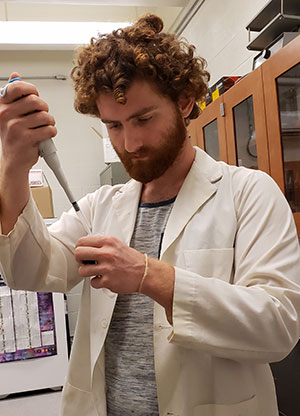My Eureka Moment: Learning the Scientific Method through Trial and Error

When asked what surprised him the most about conducting research, Matthew Bavuso, a junior majoring in biology and chemistry, responded, “I had to do a lot of troubleshooting.”
In summer 2019, Bavuso collaborated with Professor Eric Johnson of Virginia Wesleyan’s Biology Department on a project that examined the evolution of plants through a family of glycoproteins known as arabinogalactan proteins. Bavuso elaborated, “I looked at how the arabinogalactan proteins were present or diminishing across periods of development in the moss Physcomitrella and fern Ceratoptris.” This is critical research in the study of plant evolution, for understanding their roles in the oldest lineages of plants offers insight into the evolution of all plant life.
After studying plant genetics in courses and consulting with Johnson about experiment design, Bavuso thought he was well prepared to undertake this research. However, in the beginning, the experiments failed. As he explained, “You don’t really see that in a lot of college labs because the professors have finely tuned the experiments to guarantee success. If the experiment failed, it’s because you didn’t follow the steps properly.”
But this research was different. There was no formula to follow. Bavuso, working alongside Johnson, had to problem solve his way to success. “I had to engage in a discourse with my mentor. I had to discover at what point the experiment went wrong and how to correct it,” he recounted. Chartering this new territory, “wasn’t something I was really familiar with. I had to go through the processes myself to figure it out.”
And he did figure it out. As he recalled, “One of the most memorable moments was when the experimental procedure worked for the first time. I was filled with excitement! And I rushed to share the success with Dr. Johnson.” Bavuso continued, “When scientists talk about their ‘eureka’ moments and how they felt, I had never really understood — until I had mine.”
Bavuso continues to collaborate with Johnson on a paper about this research for a scientific journal. As he foresees, this publication will “give me a lot of credibility when I apply for jobs where I will be performing similar tasks.”
Johnson also stressed the vitality of student-faculty research collaboration at Virginia Wesleyan. “I recall when Matthew was a freshman. We had a number of conversations outside of class about new topics emerging from the molecular biology field.” Johnson continued, “He has been one of the most ambitious and curious students I’ve worked with at VWU. I’m really proud of his tenacity in establishing some of the techniques needed for this project.”
To undertake this research, Bavuso received grants from both the Virginia Foundation for Independent Colleges and Virginia Wesleyan’s own Summer High Impact Practice Program (SHIPP), which provides funding to students to take part in research, internship, and study away experiences during the summer. SHIPP is administered by The Athenaeum: Center for Exploration and Discovery.
Reflecting upon his research experience, Bavuso recognized that he had learned a pivotal lesson about doing science. “Science is not always easy. When you take on a project that both you and your mentor know little about, you won’t always be able to ask your mentor questions.” But the scientist persists, for tackling the unknown goes to the very heart of scientific discovery.

